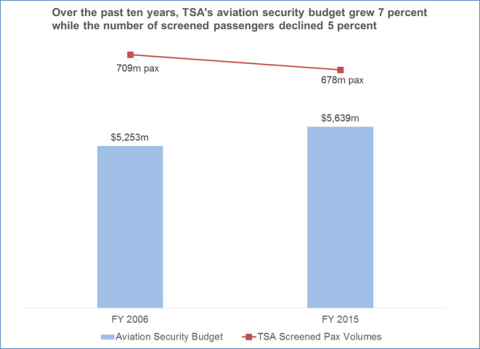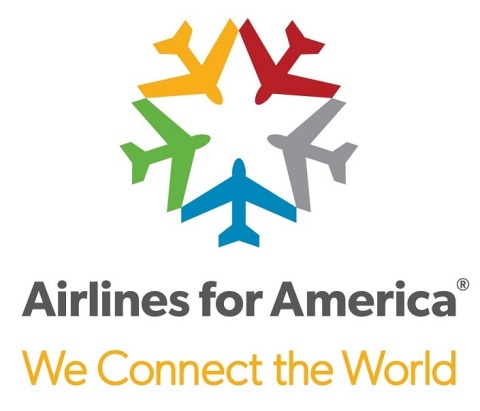WASHINGTON--(BUSINESS WIRE)--Airlines for America (A4A), the industry trade organization for the leading U.S. airlines, today called on Congress to return $13 billion in Transportation Security Administration (TSA) fees that have been diverted since 2013 to offset the deficit and use those resources to pay for security screening as intended. A4A also called on the TSA to take actions to improve airport wait times, in addition to the work its members already have underway, and responded to calls to adjust airline pricing.
In a letter to Sen. Dick Durbin (D-IL), A4A President and CEO Nicholas E. Calio noted that pursuant to the Bipartisan Budget Act (BBA) of 2013, Congress diverted $13 billion of passenger 9/11 fee revenue over 10 years to pay for deficit reduction.
“That decision has come home to roost,” Calio said. “If Congress wanted to take constructive and well-justified action, it would immediately pass legislation putting that money, paid by airline passengers, where it belongs.”
A4A said the root problem with the excessive security lines is a failure to align TSA staff and equipment with the latest passenger volumes by location, and in fact, more of TSA’s budget is going toward non-aviation related functions. TSA has advance access to passenger flight data to make adjustments to staffing as volumes fluctuate by location, and A4A urged the agency to use this information to ensure that staffing and equipment is sent to airports where they are needed most.
TSA’s aviation security budget grew seven percent from 2006 to 2015, yet the number of passengers screened has declined five percent during the same time period, suggesting resources are not currently allocated where needed.
More specifically, A4A called for the TSA to:
- Release best practices learned from optimization visits the agency has made recently;
- Provide Federal Security Directors (FSDs) the ability to make local decisions about manpower resource allocation – without having to consult with TSA headquarters;
- Fast-track a robust marketing campaign for TSA Pre✓™ in coordination with airports and airlines, and consider adjusting or waiving the fee for enrollment in the short term;
- Deploy Passenger Screening Canines (PSCs) to the airports we anticipate being most adversely impacted by staffing shortages; and
- Redeploy Behavior Detection Officers (BDOs) to staff the Travel Document Checker (TDC) position and put the TDCs at the checkpoint to perform screening function.
A4A highlighted actions airlines are taking to help lines move faster and improve the passenger experience for our customers:
- Our members are hiring vendors to provide additional support staff to assist with things like moving bins, staffing exit lanes and line management. By having these workers provide non security functions, we are at our own cost, freeing up TSA agents to screen more passengers.
- We are promoting TSA Pre✓™, and our members are waiving the cost for some frequent flyers, allowing them to use frequent flyer miles to pay for the cost and giving TSA space in airports to set up Pre-Check walk-up processing stations.
- Our members are working with TSA to provide other resources and experience to help solve the wait time issue. TSA needs develop a credible staffing model to determine how staffing should be allocated to maximize efficiency. It’s been years since the TSA has shared their staffing model with stakeholders. Airports and airlines have great expertise in staffing models and could be valuable resources in this effort.
- A4A has created www.iHateTheWait.com as a crowd-sourcing tool allowing passengers easy access to social media platforms Twitter and Instagram where they can post photos of security lines and wait times to help their fellow travelers.
A4A also responded to calls to waive baggage fees as a solution to reducing the recent excessive airport security lines, noting that the excessive airport security lines are a recent development, whereas the model of charging customers for services they use and value, like checking a bag, has been in place since 2008. Most flyers who check a bag do not pay a fee, and the TSA’s own data notes the number of checked bags has remained relatively unchanged for the past six years. Not only does the data not support a causal relationship between recent lines and baggage fees, it would be illegal for airlines to jointly agree on any pricing policy, including bag fees.
A4A noted that the TSA is struggling with screening both passengers and baggage, further indicating waiving baggage fees and checking more luggage would not improve the passenger experience. Phoenix and Miami, for example, have had problems recently with baggage screening delays resulting in passengers missing connecting flights and luggage piling up for screening. Even airports where the dominant airline includes the bag in the price of the ticket are experiencing excessive security wait times. Chicago Midway, for example, is served predominantly by an airline that does not charge separately to check a bag, yet airport security wait times are still in excess of 90 minutes.
ABOUT A4A
Annually, commercial aviation helps drive nearly $1.5 trillion in U.S. economic activity and more than 11 million U.S. jobs. Airlines for America (A4A) vigorously advocates on behalf of the American airline industry as a model of safety, customer service and environmental responsibility and as the indispensable network that drives our nation’s economy and global competitiveness.
America needs a cohesive National Airline Policy that will support the integral role the nation’s airlines play in connecting people and goods globally, spur the nation’s economic growth and create more high-paying jobs. A4A works collaboratively with the airlines, labor groups, Congress and the Administration to improve air travel for everyone.
For more information about the airline industry, visit our website airlines.org and
our blog, A Better Flight Plan, at airlines.org/blog.
Follow
us on Twitter: @airlinesdotorg.
Like
us on Facebook: facebook.com/AirlinesforAmerica.
Join
us on Instagram: instagram.com/AirlinesforAmerica.
To learn how you can support a National Airline Policy, a better flight plan for everyone, visit www.nationalairlinepolicy.com.




